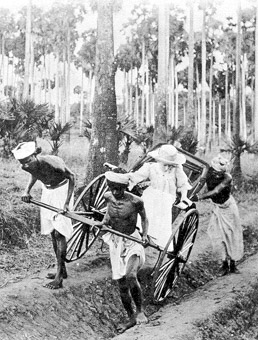Answering the Origins of Capitalism
By: Tamara, 2009 (Updated 2014)
Answering an anonymous praise for capitalism.
Q: “Since the origins of modern capitalism c. 1780, more than two-thirds of the world’s population has overcome poverty. In China and India, more than 500 million have been raised out of poverty in just 40 years. In almost every nation the average lifespan has risen dramatically. Health in almost every dimension has been improved, and literacy has been carried to remote places it never reached before. Capitalism works.”
A: Honestly, I don’t believe the origin of modern day capitalism can actually be dated for two reasons. Not one scholar can agree on which century fostered the infancy of the social contract and there are an uncountable number of fragmented applications of the system across the last few millennia. The reality is it doesn’t matter who, or what you read – wild variants in time postulates swing anywhere from the fifth century all the way up to the 16th. But even when we cast these wide guesses, the conclusions are still variably inaccurate.
If you’ve taken to any moderate reading, or even watched a documentary or two on Rome, the Moors, India, China, ect… you’ll see an abundance of empires come to power through advocating business/production ownership, free trade, had currency and free labor. But because this topic isn’t more thoroughly discussed in public, we assume capitalism is relatively new – even though it’s not. I think such discrepancies exist partly because history is filled with too many Atlantis’s, too many lost civilizations from which the only survivors are intangible knowledge, skillsets, religion, and customs – and partly because capitalism comes in so many different practices. You don’t really think about it but capitalism is very customizable. You can have anything from state, imperial, corporate, and crony capitalism to social-market, techno, unicorn farts, and other types of mixed-economy capitalism.

The emerging economic cycle from prehistory and on seems to indicate a constant trend of pasturalism/tribalism, to feudalism. You would then “pass go, do not collect $200” before landing on capitalistic tendencies, then into the final throws of a self-imploding oligarch, and finally landing on the pasture all over again. At any point in the time the growth cycle can be influenced/prolonged/shortened via invasion or path crossings with other empires at different points in their own cycle. Advancements in civilization have come around in this way but the social contracts remain constant.
‘Some people are just in most opportune positions while others are going on their four or five hundredth year of limping along.’
Anyway, the argument is really that capitalism’s origins can’t be agreed on so whose to say what is modern? Perhaps we’re somewhere in the middle of the system’s development. Maybe it’s eternal? Maybe it compounds societal regression with every phase? Maybe we run in cycles, as I talked about earlier and as some scholars would argue.
America’s relationship with capitalism could definitely be argued to coincide with the American Revolution but you’d run into scholarly arguments on the contention we were only shifting from colonialism to mercantilism, instead. But of course some scholars would argue mercantilism is capitalism [Veblen], and some [Marx] would say it’s in a league of its own. Again – these things aren’t so easy to debate when no agreements can be made. So philosophy is only a philosophy but whatever the case may be, my personal belief for today’s capitalism rises more from the unification of Reconstruction. After Lincoln. Streamlining production usually is a societal clue capitalism is in practice so I associate the beginning of today’s free trade and labor with streamlining industry through machinery and industrialization of the United States on whole, and not of just the North or South.
To argue statistics of poverty from a historical standpoint, for many reasons, is pointless. More than two-thirds of the world’s population didn’t exist in 1780 and the countries who were ahead of the game, then, are still with us in the first world order today. The rest of the countries, ironically – where lost empires are still being discovered, and where colonialism left their accumulated wealth depleted, also gave way to capitalism. But they still lay in ruin and poverty. All anyone can accurately say about today’s capitalism is it has continued where colonialism left off, shifting surpluses and resources at a cost of the quality of life on the lower end of the first world, and all areas of the third world. There’s definitely a trade off, as there has always been under any contract. Some people are just in most opportune positions while others are going on their four or five hundredth year of limping along.
‘Poverty, in history, is always a constant while a lot of everything else remains variable.’
Of course the only thing that is truly different about today’s capitalism was the advent of nationalism, which is now rolling over to globalism, which is something I wouldn’t necessarily label as capitalist. Moreover, just human nature. Evidently all empires have been working towards a greater consolidation, whether they knew it, or not. I would almost agree with Smith and Veblen of socio economic scholarship, and say capitalism is human nature! But it’s the ideologies like Buddhism, Hinduism, Jainism, Shintoism, Sufism, Roman Law, Eurocentrism, Feudalism, Colonialism, Mercantilism, and Manifest Destiny American Exceptionalism that make it feel fragmented and unnatural.
Remember if you look at empires before Rome – you can see societies that practiced most of the five major edifices of capitalism; production for profit, currency, free labor, private investments, company distribution – but the historical kicker is these societies mostly got along best under a more egalitarian flavor of rule – till they were invaded, of course. That’s not to say poverty didn’t exist. Poverty, in history, is always a constant while a lot of everything else remains variable.

https://www.sscnet.ucla.edu/southasia/newmanas/Original%20Files/memsrickshaw.jpg
I don’t know about the “500-million lifted from poverty in 40 years” stat. When you consider the British empire in India ended very recently, in 1947, and brought with it an utterly collapsed textile and spice surplus, I wouldn’t consider that much of a successful story for capitalism. I can tell you one thing the type of capitalism, you’re most likely referring to, did contribute to, in respect to your statistical quote, and that’s it well more than quadrupled the world’s population since 1804, [UN Stat]. It also took common salt of the earth jobs like farming and trades, and marginalized them into factories. So what we ended up having is a ton more people with a hell of a lot less to do for work, by virtue of industrialization and imperialistic corporate capitalism.
Speaking on poverty, what is the definition of “not poverty?” Especially in the face of North America’s own slums and poor, or before the rule of the British in India, and the British in the US? Could you call tribal life poverty? Before the European invasions, the indigenous had what they needed, when they needed it. Seems to me that’s not the actual definition of poverty. As of today, crony capitalism has sent all of the major U.S. manufacturing and a massive portion of labor over to countries where they can get away with paying barely anything in a kind of a second round of an industrial colonialism ponzi scheme, if you had to give it a name.
In the wake of this exportation of American labor, and the exploitation of the world’s poor, those capitalistic corporations have undermined the shred of dignity workers spent 150-years fighting and dying for in the modest name of labor rights. I’m pretty sure no other empire’s peasants felt a need to unionize. The first record I’ve read on unionized workers, that predates May Day and such, was when Kerala, India got tired of the British rule. But again, remember – humanity has always been moving towards quantity and consolidation so workers losing their industries is/was an inevitable fate. It’s just, the kind of faceless dynasty governing today’s capitalism doesn’t care about integrating the jobless the way previous empires did, for better or worse. [examples: Chola, Harappan, & Magadha Empires, to name a few]
‘I would argue that if you’ve made it this far into my paper, you’re a rock star.’
Lastly, we’re talking about lifespans and literacy? As soon as people understood hygiene, lifespans expanded. Now I’m not going to knock any innovation the competition of capitalism has brought about with medicine and medical knowledge, like the advent of penicillin and the x-ray machine, but advances had always been made for as long as we can trace back into our ancestry. Let’s not forget what innovators De Vinci, Hippocrates, and lesser known Bassi, Schwann, and Pasteu were. I couldn’t possibly give capitalism all the credit for longer lifespans. Especially when the current day crony capitalism’s goal is to extract resources at all costs. Overall, I’d consider today’s lifespan success a cumulative effect of 2,000+ years of social and religious knowledge.
Again, the same with literacy – there’s no way you can attribute literacy to capitalism. I could write the most boring 6,000 word article on the topic of defining literacy and barely cover the scholarly discourse being had about the quantitative, qualitative, and plural discrepancies of measuring literacy [Peter Roberts – British Journal of Educational Studies]. For instance, to cherry pick a point made, here – a point that’s against the argument that people are more literate today, than when Thomas Pain wrote, “Common Sense.” It’s such an ambiguous accusation because it doesn’t take into account the long prose people wrote in, and comprehended back then. Much better than we do now! We only speak in, and comprehend, short sound bites now. Some scholars would even argue we live in a post literate age. I would argue that if you’ve made it this far into my paper, you’re a rock star.

Beyond the antithetical arguments, above – when you’re considering a growth in international literacy, you cannot forget the immense influence the church and the advent of the printing press had on society. The rates statistically begin to rise mostly thanks to Gutenberg. And the rates move right along with how much more streamlined and affordable printing became – which is more a consequence of a growing general demand, over capitalism. But who are we kidding? Even with a stunning literacy rate the people’s understanding of history and reading hasn’t done a whole lot to preserve a viable socio-economic system. We have a long way to go and if the post literacy age argument holds any truth, then the National Center for Education Statistics would agree with the assessment. The NCES published a marked stagnation in US literacy rates beginning in the 1980s and showing no change from 1992-2002. How’s that for a consumer capitalist utopia?
The bottom line of this whole exploration of capitalism is to refute the final claim that “capitalism works.” It’s such a loaded gun statement to make. A gun loaded with a bunch of blanks. Almost kind of an arrogant and, ironically, illiterate exaggeration in the face of three millennia of human survival and adaptation we’ve only begun to accurately research. Of course capitalism works but just like any law of nature, it doesn’t work alone.


